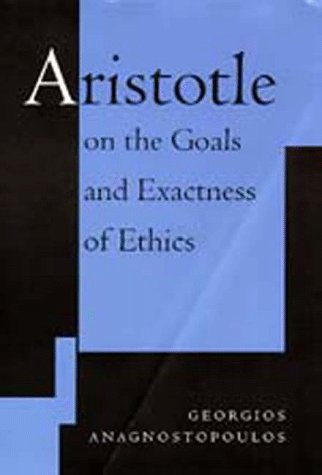
Aristotle on the Goals and Exactness of Ethics
by Georgios Anagnostopoulos
Publisher: University of California Press 1994
ISBN/ASIN: 0520081250
ISBN-13: 9780520081253
Number of pages: 474
Description:
The author offers the most systematic critical examination to date of Aristotle's views on the exactness of ethics. Combining rigorous philosophical argument and analysis of the philosopher's treatises on human conduct, he gives form to Aristotle's belief that knowledge of matters of conduct can never be free of certain kinds of inexactness. He concludes that according to Aristotle, ethics constitutes a mode of knowledge that is neither totally nondemonstrative on account of its inexactness nor free of the important epistemological difficulties common to all nonmathematical disciplines.
Download or read it online for free here:
Read online
(online reading)
Similar books
 Practical Ethics
Practical Ethicsby Viscount Samuel - Oxford University Press
Ethics seeks to answer two questions: What is to be regarded as right and as wrong? Why should people do what is right and not do what is wrong? In other words, the questions are What is the content of morality? What is the sanction for morality?
(11149 views)
 The Metaphysical Elements of Ethics
The Metaphysical Elements of Ethicsby Immanuel Kant
If there exists on any subject a philosophy (a system of rational knowledge based on concepts), then there must also be for this philosophy a system of pure rational concepts, independent of any condition of intuition, in other words, a metaphysics.
(9396 views)
 The Ethics
The Ethicsby Benedict de Spinoza - D. Van Nostrand
Spinoza uses the methods of Euclid to describe a single entity, properly called both 'God' and 'Nature'. From this follow the identity of mind and body, the necessary causation of events and actions, and the illusory nature of free will.
(11215 views)
 A Problem in Modern Ethics
A Problem in Modern Ethicsby John Addington Symonds
In this work, Symonds argues against the belief that homosexuality is acquired. The book includes an historical survey of homosexuality, various modern theories as to its cause, and a section dealing with suggested amendments in legislation.
(14377 views)